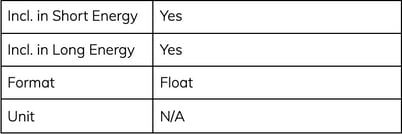Understanding Data Captured by the Auditor
Recording data and Transmission Explained
The Auditor is an energy monitoring device that captures a wide variety of data from a site in Short Energy and Long Energy. The circuits that it is monitoring including:
- Active/Real Energy
- Reactive Energy
- Voltage
- Current
- Frequency
These foundations that are captured and reported by the device can be used to calculate a wider range of data points (such as reactive power, and power factor). The data is then displayed in our Wattwatchers applications including our MyEnergy app. Data is also available via our REST API.
Short Energy (SE)
Short energy data is captured every 5 seconds.- Recording:
- Energy: Accumulated over each 5-second interval.
- Voltage, Current, and Frequency: Instantaneous snapshots taken at the end of each 5-second interval.
- Transmission: Every 30 seconds, an aggregated data packet is sent on a "best efforts" basis, similar to MQTT QoS level 0 (at most once).
- Energy: The sum of the energy values from the six 5-second intervals.
- Voltage, Current, and Frequency: Instantaneous readings from the last 5-second interval within the 30-second period.
Long Energy (LE)
Long energy data is a 5-minute aggregation of the 5-second (short energy) data.- Transmission: Sent at the 5-minute boundary. If the device is offline, this data is logged locally and sent to the servers when the device comes back online, ensuring it is transmitted at least once (similar to MQTT QoS level 1).
- Purpose: Provides more reliable and aggregated data for analysis over longer periods.
Data available via the API
Our REST API provides options to get the raw data from our devices, as well as providing options to calculate common conversions for key fields.
eReal
Active/real energy.
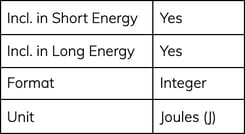
eRealPositive
Positive active/real energy. Over the Long Energy period there may be points of negative energy (e.g. drawing energy from the grid) that are masked in the eReal value for the same period. For example, if the overall total is negative (for example if solar generation results in an overall export for the period). eRealPositive enables you to determine the total positive flows during the period.
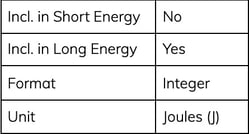
eRealNegative
Negative active/real energy. Over the Long Energy period there may be points of negative energy (e.g. exports to the grid) that are "hidden" in the eReal value for the period if the overall total is positive. eRealNegative enables you to determine the total negative flows during the period.

eReactive
Reactive energy.

eReactivePositive
Positive reactive energy.

eReactiveNegative
Negative reactive energy.

vRMS
Volts Root Mean Square (RMS).

vRMSMin
Minimum Volts RMS. As voltage is an instantaneous value, only the minimum and maximum that occurred within the period are reported for Long Energy.

vRMSMax
Maximum Volts RMS. As voltage is an instantaneous value, only the minimum and maximum that occurred within the period are reported for Long Energy.

iRMS
Current Root Mean Square (RMS).

iRMSMin
Minimum Current RMS. As current is an instantaneous value, only the minimum and maximum that occurred within the period are reported for Long Energy.

iRMSMax
Maximum Current RMS. As current is an instantaneous value, only the minimum and maximum that occurred within the period are reported for Long Energy.

frequency
Voltage Frequency. Measured off P1.
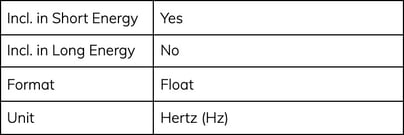
eRealKwh
Real Energy converted from Joules to kilowatt-hours.

eRealPositiveKwh
Positive Real Energy converted from Joules to kilowatt-hours.

eRealNegativeKwh
Negative Real Energy converted from Joules to kilowatt-hours.

eReactiveKwh
Reactive Energy converted from Joules to kilowatt-hours.

eReactivePositiveKwh
Positive Reactive Energy converted from Joules to kilowatt-hours.

eReactiveNegativeKwh
Negative Reactive Energy converted from Joules to kilowatt-hours.

pRealKw
Real Energy converted from Joules to kilowatts. Note this is a conversion of energy to power, thus the prefix changes to p.

pRealPositiveKw
Positive Real Energy converted from Joules to kilowatts. Note this is a conversion of energy to power, thus the prefix changes to p.
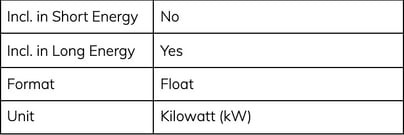
pRealNegativeKw
Negative Real Energy converted from Joules to kilowatts. Note this is a conversion of energy to power, thus the prefix changes to p.

pReactiveKw
Reactive Energy converted from Joules to kilowatts. Note this is a conversion of energy to power, thus the prefix changes to p.

pReactivePositiveKw
Positive Reactive Energy converted from Joules to kilowatts. Note this is a conversion of energy to power, thus the prefix changes to p.

pReactiveNegativeKw
Negative Reactive Energy converted from Joules to kilowatts. Note this is a conversion of energy to power, thus the prefix changes to p.

powerFactor
The calculated power factor for the channel.
